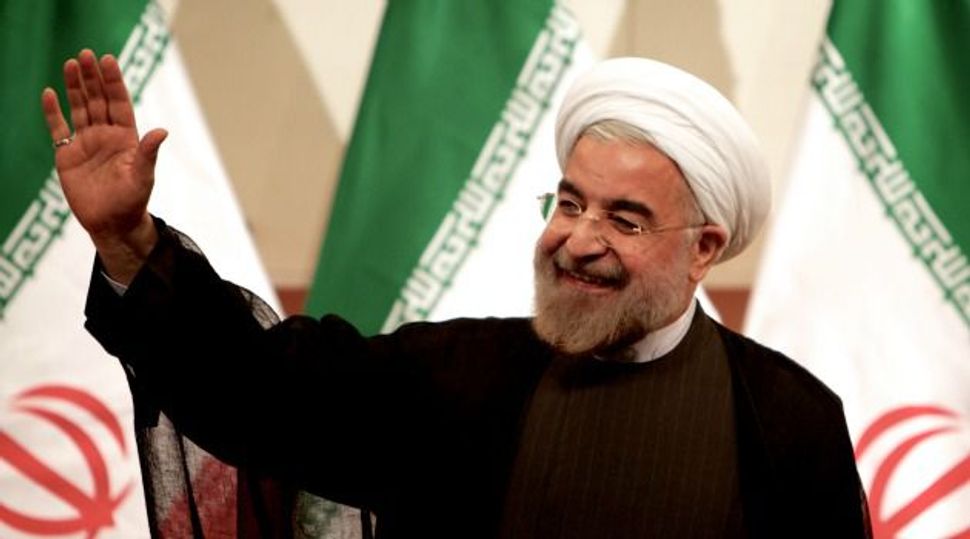Hassan Rowhani’s Election Is Game-Changer for Iran, the West — and Israel

Earthquake in Iran: Down believe the downplayers. Hassan Rowhani?s landslide victory is an earthquake in Iranian politics and is likely to transform the Islamic republic?s relations with the West and Israel. Image by getty images
Israel’s government is trying to downplay the results of Iran’s presidential election, but the fact is that Hassan Rowhani is immensely different from the departing Mahmoud Ahmadinejad.
Immediately after the elections results were announced in Tehran, Prime Minister Benjamin Netanyahu said that the international community must not be tempted to relax the pressure on Iran to stop its nuclear program.
But the election of Rowhani — and the unforeseen nature of his victory — represents a political earthquake, a bombshell in domestic and international politics. It certainly looks like Iranians have elected a reformist. Rowhani was clearly — among the six officially approved candidates — the one least liked by the supreme leader, Ayatollah Ali Khamenei. And Rowhani promised change.
Although Israeli intelligence devotes huge energy and resources to monitoring Iran — Iran’s secret nuclear project, its military, its politics and its society — the Israeli espionage agencies did not see Rowhani’s victory on the horizon.
They certainly did not expect that Rowhani would win an outright majority in the first round of voting, with no runoff required.
The Mossad and Aman, in their briefings to the Cabinet, assumed that Khamenei would stop at nothing to install one of his reliable loyalists as Ahmadinejad’s successor. The supreme leader had many disagreements with Ahmadinejad, partly over the talkative president’s bombastic style and inflated ego, and Khamenei was expected to avoid further headaches. If necessary, it was thought, he would rig the election — just as hard-liners were believed to have done in 2009.
A landslide for a candidate who told voters he would work for peace and security? The only candidate who mentioned the sanctions that are adding to the suffering of many Iranians? A Muslim cleric, but one who spoke in favor of press freedoms and negotiating with the West?
Experts don’t understand Iran. The win by Rowhani was wholly unexpected, and it shows that trusted and prestigious Western experts don’t understand Iran — and the complex undercurrents of an ancient culture that is struggling with a blend of modernity and religious extremism.
Remember Rowhani’s restraint. In 2003, as a top official in “reformist” President Mohammad Khatami’s administration and his chief nuclear negotiator with the West, it was Rowhani who directed the decision to freeze uranium enrichment.
(Israeli and American officials firmly believe that the reason for this was that Iran’s supreme leader feared that the United States might attack Iran at that time, just after the American invasions of Iraq and Afghanistan. Israel’s defense minister said this week that Iran’s uranium enrichment restarted in 2005 and is getting close to the amounts of enriched uranium needed to “break out” and build nuclear bombs).
Might Rowhani freeze or reverse Iran’s nuclear work as part of a deal with the West. Would the supreme leader and Islamic Revolutionary Guards let him do that? They may block any and all “reformist” ideas voiced by Rowhani.
Iran already has the materials, hardware, software, technology and knowledge necessary to build its first nuclear bomb — though not yet the ability to put one in a warhead atop a missile. For all practical matters, Iran is already a nuclear power.
Rowhani’s election win signals a growing possibility that Iran will decide to slow down its nuclear project. That would be part of a policy of engaging with the United States (as everyone assumes that President Obama would dearly like to avoid waging war against Iran).
So here is another unexpected result: that Israel will be further isolated in its severe concern over Iran’s nuclear capabilities (and continued support for Syria’s regime, for Hezbollah and for terrorism around the world). The gap between Israel and America on these issues may well be further widened.
For better or worse — mostly for better — a military strike against Iran is buried even deeper.
Yossi Melman, an Israel commentator on security and intelligence matters, is a senior contributor to the Tower.org and a co-author of “Spies Against Armageddon: Inside Israel’s Secret Wars.” (Levant Books, 2012).















